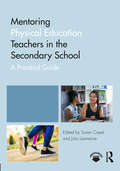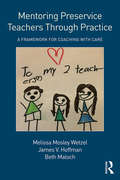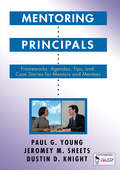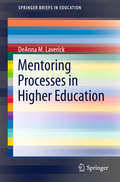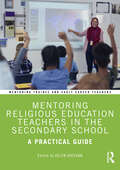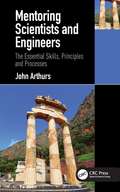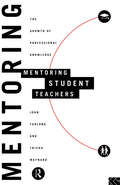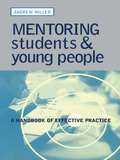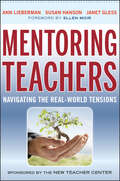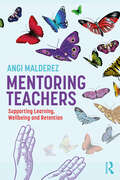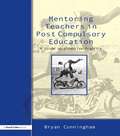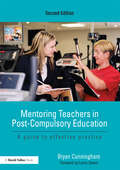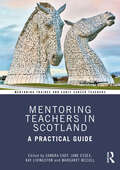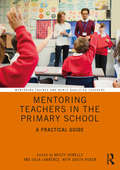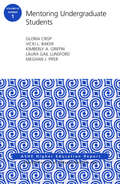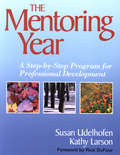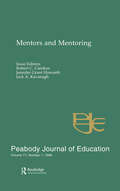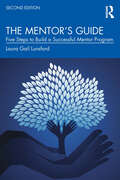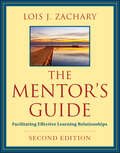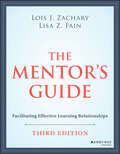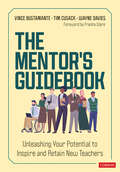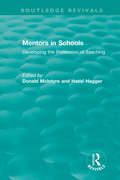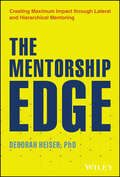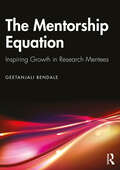- Table View
- List View
Mentoring Physical Education Teachers in the Secondary School: A Practical Guide (Mentoring Trainee and Newly Qualified Teachers)
by Susan Capel Julia LawrenceMentoring Physical Education Teachers in the Secondary School helps trainee and newly qualified mentors of physical education teachers in both developing their own mentoring skills and providing the essential guidance their beginning teachers need as they navigate the roller-coaster of the first years of teaching. Offering tried and tested strategies based on the best research and evidence, it covers the knowledge, skills and understanding every mentor needs and offers practical tools such as lesson plans and feedback guides, observation sheets, and examples of dialogue with beginning physical education teachers. Together with analytical tools for self-evaluation, this book is a vital source of support and inspiration for all those involved in developing the next generation of outstanding physical education teachers. Key topics explained include: Roles and responsibilities of mentors Developing a mentor-mentee relationship Guiding beginning physical education teachers through the lesson planning process Observations and pre- and post-lesson discussions Filled with the key tools needed for the mentor’s individual development, Mentoring Physical Education Teachers in the Secondary School offers an accessible guide to mentoring physical education teachers with ready-to-use strategies that support, inspire and elevate both mentors and beginning teachers alike.
Mentoring Preservice Teachers Through Practice: A Framework for Coaching with CARE
by Melissa Mosley Wetzel James V. Hoffman Beth MalochSupporting and challenging cooperating teachers to grow in their mentoring and coaching practices with preservice teachers and also in their own work as classroom teachers, this practical guide presents and illustrates the Coaching with CARE model—a framework for reflection and action that helps cultivate a perspective on teaching that puts students at the center of teacher preparation and places value on apprenticeship and participation in learning. The CARE model takes a turn away from traditional evaluation-based "training" approaches, offering a way for cooperating teachers, and facilitators and university teacher educators who work with them, to come together to shape innovative coaching and mentoring experiences for preservice teachers. Mentoring Preservice Teachers Through Practice, building on the authors’ own work with cooperating teachers, is based on the most recent research on learning to teach and supporting preservice teachers and grounded in the realities of teacher education today. Each chapter includes questions for discussion and suggested readings that can be used to explore the focus of the chapter more deeply as well as relevant research reports published by the authors.
Mentoring Principals: Frameworks, Agendas, Tips, and Case Stories for Mentors and Mentees
by Paul G. Young Mr Jeromey M. Sheets Mr Dustin D. KnightThis indispensable handbook for mentors, mentees, and new principals will jump-start the learning process of new principals by providing case stories and wisdom from leading mentors across the country.
Mentoring Processes in Higher Education
by Deanna M. LaverickThis book portrays the various ways in which mentoring occurs in higher education. Targeting the stakeholders who benefit from mentoring, namely faculty, graduate and undergraduate students, and their professional colleagues, this book supports those who are involved in the mentoring process. It synthesizes the professional literature on mentoring and shares examples of effective practices that address the needs of mentors and their protégés. The book describes mutual benefits of mentoring, along with the characteristics of effective mentors and the ways in which they may support their protégés. The relationships discussed in Mentoring Processes in Higher Education surround mentoring new faculty; peer mentoring for professional development; mentoring through research, scholarship, and teaching opportunities; and mentoring through field experiences, athletics, and student organizations. The book shares the voices of mentors and their protégés as it illustrates how mentoring relationships form the basis for reflection, a transaction of ideas, and growth in knowledge and skills to ultimately advance the institution and field through a collaborative environment in which stakeholders thrive and are valued for their contributions. The cyclical effect of positive mentoring is illuminated through real-life examples that show how protégés eventually become mentors in a continual process of support.
Mentoring Religious Education Teachers in the Secondary School: A Practical Guide (Mentoring Trainee and Early Career Teachers)
by Helen SheehanThis book helps mentors working with beginning teachers of religious education to develop their own mentoring skills and provides the essential guidance their mentee needs as they navigate the roller coaster of their first years in the classroom. Offering tried-and-tested strategies, it covers the knowledge, skills and understanding every mentor needs. Practical tools offered include approaches for developing subject knowledge and lesson planning, as well as guidance for the effective use of pre- and post-lesson discussion, observations and target setting to support beginning religious education teachers. Together with analytical tools for self-evaluation, this book is a vital source of support and inspiration for all those involved in developing the next generation of outstanding religious education teachers. Key topics covered include the following: Models of mentoring Your knowledge, skills and understanding as a mentor Developing mentees' religious literacy through classroom practice Supporting the planning of effective and creative RE lessons Developing mentees' knowledge and skills in the RE curriculum Supporting the delivery and evaluation of lessons Observations and pre- and post-lesson discussions and regular mentoring meetings Helping new religious education teachers develop their professional practice. Filled with the key tools needed for the mentor’s individual development, this book offers an accessible guide to mentoring religious education teachers with ready-to-use strategies that support, inspire and elevate both mentors and beginning teachers alike.
Mentoring Scientists and Engineers: The Essential Skills, Principles and Processes
by John ArthursMentoring is very much more than simple one-to-one informal instruction, or what used to be called ‘coaching’. Modern mentoring techniques are modelled on those of executive coaching as well as expert academic tutoring. Mentoring is simple but not necessarily easy. An estimated 40% of all mentoring schemes fail through lack of mentor training and understanding. No great effort is required to study the literature but, for mentoring to be effective, adherence to basic principles and exercising specific skills is absolutely necessary. The book provides an introduction to what we mean by mentoring and its basic skills – skilful questioning, active listening, building trust, self-management and giving advice and feedback. It further covers mentoring principles, how to conduct mentoring sessions and a wide range of practical applications. The final chapter gives the outlines and principles for creating a basic mentoring scheme within an organisational context. This book is written for those practitioners in science, technology, engineering and mathematics, the STEM fields, who have been pitched into the role of mentor without any prior training. Its objective is to alleviate anxiety, frustration and stress caused by not knowing exactly what is expected. In offering an introduction to mentoring it gives practical guidance as a quick and easy read.
Mentoring Student Teachers: The Growth of Professional Knowledge
by John Furlong Trisha MaynardIn the UK and elsewhere, the training of teachers is increasingly seen as a matter of partnership between schools and institutions of higher education. There is thus an urgent need within the profession to define more carefully what the role of teachers acting as mentors should be. Clearly some aspects of professional knowledge can only be acquired from practical experience in school, and this book draws on extensive research on students' school-based learning to isolate and analyse those aspects. Like any form of teaching, mentoring, the authors suggest, must be built on a clear understanding of the learning processes it is intended to support. In this book, they report on their research into the nature of students' school-based learning and what this means for the role of the mentoring.
Mentoring Students and Young People: A Handbook of Effective Practice
by Andrew MillerMentoring is used in a wide range of situations in education: to assist learning; to help weaker students or those with specific learning needs or difficulties; to develop community or business links; to aid the inclusion of pupils otherwise at risk of exclusion; to develop ethnic links; to enable students to benefit from the support of their peers, to name but a few.The development and proliferation of mentoring and mentoring schemes in education over the last few years has been dramatic, and presents teachers, school managers and leaders, as well as mentors themselves with a challenge. This book presents all mentors plus anyone working with young people with an invaluable guide to approaches to mentoring today. It looks at mentoring as a concept, at what mentoring is, how it is done well and how it can be made more effective. Written by a leading expert on mentoring, this practical and relevant handbook is backed up throughout by inspiring and relevant case studies and examples from schools and schemes internationally.
Mentoring Teachers: Navigating the Real-World Tensions, 1st Edition
by Susan Hanson Ellen Moir Ann Lieberman Janet GlessA useful guide for teacher mentors as they face new and difficult challenges in their work New teachers often struggle to apply their knowledge in real-world settings, and the idea of mentoring these teachers during their first years in the classroom has captured the imagination of schools all over the world. Drawn from the experiences over the last twenty years of the New Teacher Center, the book illuminates the subtleties and struggles of becoming an excellent, effective mentor. The book discusses the five big tensions of mentoring: developing a new identity, developing trusting relationships, accelerating teacher growth, mentoring in challenging contexts, and learning leadership skills. Describes in-depth the most common challenges of the mentor role A wonderful guide for both new and veteran mentors Includes engaging firsthand narratives written by mentors working in a variety of settings This book is from the New Teacher Center, an organization whose highly respected mentor training model has served over 50,000 teachers nationwide. The New Teacher Center is dedicated to improving student learning by accelerating the effectiveness of teachers and school leaders through comprehensive mentoring and professional development programs.
Mentoring Teachers: Supporting Learning, Wellbeing and Retention
by Angi MalderezMentoring Teachers provides practical guidance for teacher mentors, directly addressing common queries and concerns they may have while acting as a mentor within a diverse range of educational contexts. Drawing upon the author’s 30 years of conducting research on mentoring and working with both experienced and new mentors, this essential book provides a detailed picture of the mentoring role. Dividing the mentor role into five key aspects (Support, Acculturator, Model, Sponsor and Educator), this important resource provides step-by-step descriptions of managing mentorials in ways which: support the mentor in scaffolding a mentee’s thinking so that they can make their own informed judgements and decisions about teaching; develop the mentee’s noticing skills for responsive, adaptive teaching; guide the mentee towards recognising the relevance of others’ ideas or ‘theories’ to their own practice and experience; leave the mentee with practical ideas and plans for teaching and developing their teaching skills; and scaffold the mentee’s learning of Systematic Informed Reflective Practice (SIRP) to support their ongoing learning and development by themselves. Mentoring can, if effective, contribute to mentees’ learning, wellbeing and retention in the profession. Mentoring Teachers describes effective mentoring practice and is a crucial read for any mentor, aspiring mentor or mentor programme co-ordinator.
Mentoring Teachers in Post-Compulsory Education: A Guide to Effective Practice
by Bryan CunninghamThis timely new handbook will be an essential read for all college staff who find themselves involved in mentoring trainee teachers in post-compulsory education, either through choice or necessity! Describing all of the expectations, responsibilities and rewards involved in mentoring college teachers in training; the book provides advice and support on: * What to expect as a mentor and what your mentee expects of you! * Organizing and conducting observations * Time management * Using appropriate language with your mentee * What to do when things go wrong! Accessible, practical and supportive, this book will help make mentoring an easier, more enjoyable and ultimately rewarding experience for all new mentors in the post-compulsory workplace. It will also be of great value to both teachers trainers and key staff in colleges, such as staff development managers, who play an important role in overseeing the delivery and quality of mentoring activities.
Mentoring Teachers in Post-Compulsory Education: A guide to effective practice
by Bryan CunninghamThe post-compulsory sector is complex and multifaceted, with highly diverse and sometimes challenging learner groups and subject to change from almost unending shifts in educational policy. Effective mentoring has a crucial role in the initial training of new teachers in the post-compulsory sector offering them the guidance and practical support they need to respond to these challenges. This second edition has been updated to reflect the new LLUK standards, current research and technological advances. Describing all of the expectations, responsibilities and rewards involved in mentoring, the book covers: What to expect as a mentor and what your mentee expects of you The skills, attributes and functions that make an effective mentor Organising and conducting observations Time management What to do when things go wrong Accessible, practical and supportive, this book will help make mentoring an easier, more enjoyable and rewarding experience for all new mentors in the post-compulsory sector.
Mentoring Teachers in Scotland: A Practical Guide (Mentoring Trainee and Early Career Teachers)
by Sandra EadyThis book assists mentors in developing their mentoring skills, offering guidance needed to support the development of beginning teachers in early years, primary and secondary schools in the Scottish education system, as well as supporting all teachers in their career-long professional learning. Based on research and evidence, Mentoring Teachers in Scotland explores and discusses the knowledge, skills and understanding that underpin mentoring that is responsive to individual mentees' needs. The book includes reflective activities to enable mentors to consider the application of mentoring processes in their own practice, as well as case studies and other learning activities. This book is a valuable source of support and inspiration for all those involved in mentoring and sustaining teachers’ professional development at all stages of their career. Key topics explored include: roles and responsibilities of mentors within the Scottish education system, and the Scottish model of teaching and teacher development; developing a mentor–mentee relationship; guiding beginning teachers in Scotland through the mentoring processes; strategies for observation, analysis and reflection on practice; and mentoring for beginning teachers and career-long professional learning. Mentoring Teachers in Scotland offers an accessible and practical guide to mentoring teachers in Scotland that aims to support, inspire and guide mentors and mentees.
Mentoring Teachers in the Primary School: A Practical Guide (Mentoring Trainee and Newly Qualified Teachers)
by Kristy HowellsMentoring Teachers in the Primary School helps mentors of trainee and newly qualified primary school teachers to both develop their own mentoring skills and provide the essential guidance their beginning teachers need as they navigate the roller-coaster of the first years in the classroom. Offering tried and tested strategies based on the best research, it covers the knowledge, skills and understanding every mentor needs. Together with tools for self-evaluation, this book is a vital source of support and inspiration for all those involved in developing the next generation of outstanding teachers. Key topics for primary mentors include: the role of the mentor, mentoring relationships, mentoring in specialist areas, mentoring development. Filled with guidance to support mentors’ own development, as well as the development of beginning primary teachers, Mentoring Teachers in the Primary School is a vital guide for mentors of primary school teachers, both trainee and newly qualified, with ready-to-use strategies that support and inspire mentors.
Mentoring Undergraduate Students: ASHE Higher Education Report, Volume 43, Number 1 (J-B ASHE Higher Education Report Series (AEHE))
by Gloria Crisp Vicki L. Baker Kimberly A. Griffin Laura Gail Lunsford Meghan J. PiferTake a critical look at the theory and recent empirical research specific to mentoring undergraduate students. This monograph: Explains how mentoring has been defined and conceptualized by scholars to date, Considers how recent mentoring scholarship has begun to distinguish mentoring from other developmental relationships, Synthesizes recent empirical findings, Describes prevalent types of formalized programs under which mentoring relationships are situated, and Reviews existing and emerging theoretical frameworks. This monograph also identifies empirical and theoretical questions and presents research to better understand the role of mentoring in promoting social justice and equity. Presenting recommendations for developing, implementing and evaluating formal mentoring programs, it concludes with an integrated conceptual framework to explain best-practice conditions and characteristics for these programs. This is the first issue of the 43rd volume of the Jossey-Bass series ASHE Higher Education Report. Each monograph is the definitive analysis of a tough higher education issue, based on thorough research of pertinent literature and institutional experiences. Topics are identified by a national survey. Noted practitioners and scholars are then commissioned to write the reports, with experts providing critical reviews of each manuscript before publication.
The Mentoring Year: A Step-by-Step Program for Professional Development
by Susan K. Udelhofen Kathleen A LarsonOverflowing with checklists, tools, templates, and rubrics for measuring growth toward best practice, this program provides every element needed for first-year induction.
Mentors and Mentoring: A Special Issue of the peabody Journal of Education
by Robert C. Cienkus Jennifer Grant Haworth Jack A. KavanaghThe definition and parameters of teacher education have recently been changed by the concept of mentoring. Supporters of the concept maintain that it is an effective technique for inducting and retaining new teachers, but who and what are mentors, and what attributes do they possess? Previous research has identified collaboration, enthusiasm, emotional commitment, and sensitivity as the necessary traits of an effective mentor. It has also been found that mentors are available, give immediate feedback, listen attentively, and collaboratively solve problems with mentees. Epistemological structures that best serve the mentor-novice relationship, gender issues between mentors and protégés, and moral development orientations within the mentor-intern relationship have also been investigated. Thus, mentoring is a complex activity that involves a mentor, an intern or novice, and a process within a predetermined structure. The articles in this special issue validate the fact that the terms "good mentor" and "effective mentoring relationship" often elude easy definition. However, a common theme emerges: The mentor-mentee relationship is a transformative one that can change the course of one's life.
The Mentor’s Guide: Five Steps to Build a Successful Mentor Program
by Laura Gail LunsfordA definitive resource that pulls together evidence from psychology, education, and organizational studies, this fully updated second edition translates research into practice and serves as a practical handbook on how to set up, run, and evaluate any mentoring program. Despite ever-growing interest, there are few helpful resources for program managers and mentoring coordinators. This book sheds needed light on mentoring behaviors, the stages of mentoring, elements of high-quality relationships, and how to recognize and avoid dysfunctional ones. Step-by-step guidance will enable readers to: · Understand what mentoring is (and is not) · Assess their mentoring program using a clear framework · Work through steps to design or redesign an effective mentoring program · Draw on real-world examples to assess and improve programs · Benefit from all-new material for this second edition, including a chapter on e-mentoring and in-depth case studies, as well as updated information on culturally intelligent mentoring and more If you manage or support a mentoring program, then this handbook is for you. Human resource professionals across industries will gain ideas on how to improve the efficiency and effectiveness of mentoring, while administrators in higher education will value the content on formal mentorship programs for faculty members, graduate students, and undergraduates.
The Mentor's Guide
by Lois J. ZacharyThoughtful and rich with advice, The Mentor's Guide explores the critical process of mentoring and presents practical tools for facilitating the experience from beginning to end. Now managers, teachers, and leaders from any career, professional, or educational setting can successfully navigate the learning journey by using the hands-on worksheets and exercises in this unique resource.
The Mentor's Guide: Facilitating Effective Learning Relationships
by Lois J. Zachary Lisa Z. FainExplore the latest edition of an authoritative resource on professional and educational mentoring In the newly revised Third Edition of The Mentor’s Guide: Facilitating Effective Learning Relationships, veteran mentoring experts Lois J. Zachary and Lisa Z. Fain deliver a thoughtful and rich exploration of the critical process of mentoring. The book offers practical tools for facilitating the mentoring experience from beginning to end. In addition to walking you through the four phases of mentoring—preparing, negotiating enabling growth, and coming to closure—this important book provides: Brand-new content on diversity, inclusion, and equity, as well as tools to enhance virtual mentoring relationships The ethics of mentoring, including how to handle common ethical pitfalls and mistakes Hands-on worksheets and exercises to facilitate the mentoring and learning process Perfect for leaders, managers, and educators, in any career or professional setting, The Mentor’s Guide is an indispensable tool to help navigate your learning and mentoring journey.
The Mentor′s Guidebook: Unleashing Your Potential to Inspire and Retain New Teachers (Corwin Teaching Essentials)
by Vince Bustamante Timothy Cusack Wayne DaviesBe the best mentor for early career teachers Mentors are critical to the success of new and aspiring teachers. In a time when so many teachers are leaving the profession within the first few years of their career, empowering mentorship can make a world of difference—not only for teacher retention, but instructional quality and positive student outcomes. Written for any mentor who is new to the role or wants to reinforce or build upon their existing skills, The Mentor′s Guidebook walks you through the core concepts of being an inspiring mentor and guide. Inside, you′ll discover Your personal Mentorship Modality How to create an environment for effective mentorship and build and maintain your momentum An exploration of various mentorship models known to be successful The role that school leadership plays in your success What to do when things do not go as planned Help reclaim and reframe the narrative of what it means to be a teacher today. With effective mentorship strategies, you can make a difference in retaining and inspiring new teachers for years to come.
The Mentor′s Guidebook: Unleashing Your Potential to Inspire and Retain New Teachers (Corwin Teaching Essentials)
by Vince Bustamante Timothy Cusack Wayne DaviesBe the best mentor for early career teachers Mentors are critical to the success of new and aspiring teachers. In a time when so many teachers are leaving the profession within the first few years of their career, empowering mentorship can make a world of difference—not only for teacher retention, but instructional quality and positive student outcomes. Written for any mentor who is new to the role or wants to reinforce or build upon their existing skills, The Mentor′s Guidebook walks you through the core concepts of being an inspiring mentor and guide. Inside, you′ll discover Your personal Mentorship Modality How to create an environment for effective mentorship and build and maintain your momentum An exploration of various mentorship models known to be successful The role that school leadership plays in your success What to do when things do not go as planned Help reclaim and reframe the narrative of what it means to be a teacher today. With effective mentorship strategies, you can make a difference in retaining and inspiring new teachers for years to come.
Mentors in Schools: Developing the Profession of Teaching (Routledge Revivals)
by Donald McIntyre and Hazel HaggerFirst published in 1996 this book brings together the work of teams in six universities involved in school-based partnerships for teacher education. Professionals from Oxford University, the Manchester Metropolitan University, Keele, Sussex, Swansea and Leicester University come together to explore the distinctive work of school-based teacher educators, discussing the role of the teacher mentor in both primary and secondary schools. Topics covered include: mentoring in the primary school, issues in the managing of mentoring, working with new teachers, and mentoring and continuing professional development. All involved in school-based teacher education – whether as mentors, teacher trainers in higher education, school senior management, advisers, or inspectors – should find the range of experience presented here invaluable in their own work.
The Mentorship Edge: Creating Maximum Impact through Lateral and Hierarchical Mentoring
by Deborah HeiserLearn how a mentor relationship can make your life more fulfilling The Mentorship Edge: Unlocking Potential, Nurturing Growth, and Creating Explosive Impact explores how we connect to others, feel valued, get pleasure from life, and believe our lives have meaning through forming mentor relationships with others. This book covers traditional hierarchical mentorship we're all familiar with, along with lateral mentoring, where you connect with a friend or colleague—someone you can be vulnerable with—whether they work in your department, another department, or outside of your organization entirely. Insight in this book is drawn from The International Association of Top Professionals 2025 Top CEO and Mentor of the Year Deborah Heiser's experience running The Mentor Project, a nonprofit mentoring organization with more than 100 mentors at the absolute top of their fields. In this book, readers will learn about: The proven benefits of mentorship in both work and home life Mentorship in various fields, including business, research, entrepreneurship, and art Classic examples of the power of mentorship, like when Steve Jobs asked Steve Wozniak for engineering help when he was at Atari The Mentorship Edge is an essential guide to demystify the special concept of mentoring and inspire individuals to engage in mentoring naturally, whether hierarchically or laterally, based on their goals and passions.
The Mentorship Equation: Inspiring Growth in Research Mentees
by Geetanjali BendaleThis textbook navigates through the complex landscape of mentorship in academic research across all levels of education. Delving into the foundational aspects of mentorship, it meticulously outlines historical perspectives, theoretical frameworks, and the essential characteristics of effective mentors and mentees.Through detailed exploration of the mentor–mentee relationship, this book provides insights into building trust, establishing clear expectations, and fostering effective communication strategies. It addresses crucial aspects of mentorship practice, including promoting diversity and inclusivity, ethical considerations, and professional development for mentors. It also explores the vital areas of mental well-being for both mentors and mentees, emphasizing the importance of recognizing signs of mental health challenges and fostering supportive relationships.Enhanced with assessment tools for mentoring effectiveness, appendices, and a wealth of examples, this interdisciplinary volume serves as an indispensable resource for undergraduate and postgraduate students, researchers, educators, and mentors alike. It can be adopted across various streams and departments which includes Management, Psychology, Education, Sociology, Anthropology, and STEM (Science, Technology, Engineering, and Mathematics) research. Its comprehensive approach not only educates but also prepares readers for practical challenges, making it an essential tool for aspiring business managers and corporate leaders from a myriad of industries.
